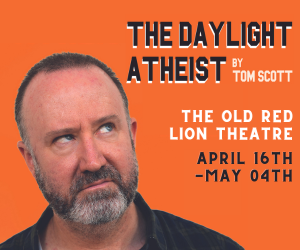Meik Wiking is the CEO of the Happiness Research Institute in Copenhagen and author of The Little Book of Hygge. The Danish word hygge is difficult to translate, but it loosely means comfort, warmth and togetherness. It’s cozy nights by the fire and enjoying a long meal with friends. Meik attributes Denmark’s perpetual ranking as one of the world’s happiest countries in part to their love of hygge. Features Writer Carly Brown sat down with him after his event at the Edinburgh International Book Festival to discuss why he thinks hygge has become a global trend, how social media affects our happiness and what we can expect from his new book.
Hygge has this focus on being present, connected, feeling warm, understood and secure
Meik’s research examines happiness, subjective well-being and quality of life around the world. He travelled extensively to research his new book, The Little Book of Lykke: The Danish Search for the World’s Happiest People, and we began by discussing his travels.
‘I travel a lot with work – the USA, Canada, Morocco, South Korea. I enjoy travel more when I can talk with people and get input on what I’m trying to understand: Why are some people happier than others? The new book focuses on the six factors that we know matter for why some people are happier, [for example] togetherness, trust, and health. Then we try to find great cases within these six domains. So the first book was about a key concept in Danish culture, but now I wanted to see what works in other places and what we can learn from each other. I think one of the key messages of the new book is that yes, Denmark does a lot of things right in terms of [creating] a happy society, but Denmark doesn’t have a monopoly on happiness.’
‘I think I’ve been to forty countries around the world in my day. But it’s my first time in Scotland. I’ve been saving the best for last. With all the rain, it feels like home [in Copenhagen].’
We then talked about hygge, whichwas the subject of Meik’s first book, as well as various other books published recently. I asked why he thought this Danish concept resonated with so many people worldwide.
‘I think it was because it was something that people were, to some extent, already doing. But the book helped them appreciate it in a new way. It gave them a language, a context and additional ideas of what to do. I think a lot of people felt seen.’
‘[The reaction] overall has been overwhelming. I’ve had an avalanche of kind letters. I received a letter from a British primary school teacher. She’s been incorporating hygge in the classroom, reading out stories to the kids and putting up fairy lights. She wrote: I don’t know how you can measure the effect of that, but their smiling faces in enough.’
I asked him if he saw any links between hygge and self-care, or other ways of taking care of one’s mental health.
‘Hygge has this focus on being present, connected, feeling warm, understood and secure. Those ingredients are also vital to our mental health and that’s why I think a lot of people see links. I hear a lot of people asking about the link between hygge and mindfulness. To us Danes, we haven’t seen it that way because we see mindfulness as a trend and hygge is something that has been going on for a long time in our culture. But with the focus on presence and the slowness of both concepts, I understand why people would see them as similar.’
I mentioned that one of the links between hygge and practicing mindfulness seemed to be a detachment from technology and focus on the present surroundings. I asked him what he thought about social media’s impact on our happiness.
‘It’s still something we need to figure out how to use in a better way. It’s constantly in the back of our minds. It can be a mental interruption and also a bombardment of great news for everybody else. Part of our life satisfaction is how we feel compared to others, so that can be a negative aspect. That said, there are also some good things to say about social media. It keeps many grandparents connected with their grandkids and allows them to follow their lives. But right now we’re struggling with how we should use these things.’
We then spoke about how his next book would have a similar tone and style to the first book – full of cozy photos and anecdotal stories from Meik’s own life combined with his research.
‘I like to keep it conversational. When I write, I imagine that I’m sitting across from somebody, having dinner and trying to explain what it is I do and see. When I do presentations, I try to combine [data and anecdotes]. We need the data and the evidence, but people don’t remember the data. They remember the stories.’
Because he has been on the road so much for work, I asked him if he thought travelling itself had any impact on our happiness and wellbeing.
‘I think it does. There’s a great sense of belonging with the human race and understanding that we are the same. Also, just experiencing a bit of adventure, seeing the world, learning things that work and trying to import them back home. One of the questions I often get is: Where should we emigrate? Which are the happiest places in the world? But I think that’s the wrong perception of it all. I would rather think about what works in different places and then incorporate them into our lives.’
Meik Wiking’s new book, The Little Book of Lykke: The Danish Search for the World’s Happiest People, will be released by Penguin Random House on September 7, 2017.











